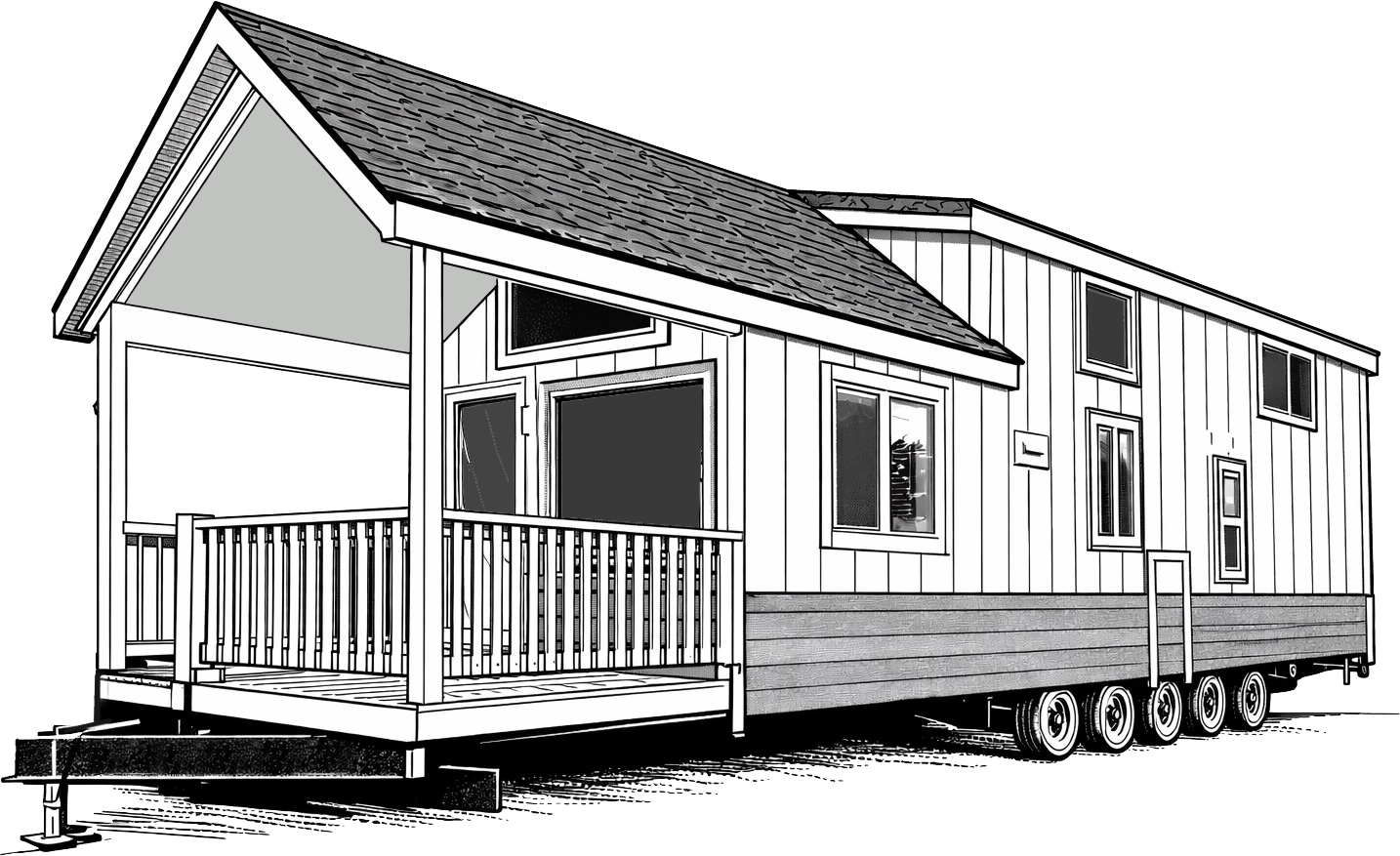
Zoning & Placement
The Complete Guide to Park Model RV Tiny Home Zoning
Park model RVs, sometimes casually called tiny homes on wheels, are one of the simplest ways to add additional living space to a property. However, how they are allowed and regulated depends entirely on how your city or county classifies them. This is why using the correct terminology from the start is critical.
When speaking with any city or county official, you must refer to these homes as a “Park Model RV built to ANSI 119.5 code.”
While many people use the term “tiny home” for short, it is a broad, informal label that can mean many different things to a city, including ADUs, site-built homes, modular homes, or non-code-compliant structures. Using the wrong term often leads to confusion or an automatic denial.
Calling it a Park Model RV built to ANSI 119.5 code clearly tells city staff exactly what type of structure you are asking about and ensures they are referencing the correct zoning rules. This single detail can significantly change the answer you receive.
Understanding and using the correct classification early in the process is one of the most important steps you can take when researching zoning and placement.
What Is a Park Model RV?
Park model RVs are built to the ANSI 119.5 standard and are legally classified as recreational vehicles, not residential structures. Because they are regulated as RVs, they follow RV rules rather than residential building codes. This typically means fewer permitting and inspection requirements compared to foundation-based homes, while still needing to comply with local zoning regulations.
All NW Tiny Homes models are park model RVs. They remain on their chassis and wheels, are under 400 square feet, built to the ANSI 119.5 code, and RVIA certified. Cities and counties regulate them as RVs based on these characteristics.

Key Features of a Park Model RV
Designed on a single chassis and mounted on wheels
Temporary living quarters for recreational, camping, or seasonal use
Certified by the manufacturer as complying with all applicable requirements of ANSI A119.5
Maximum of 400 square feet (excl. porch and loft)
Download our ready-to-share graphic to send to local planning and zoning officials
ADU Alternative
Great as a long-term rental, guest house, or multigenerational housing without the need for building permits and fees associated with an ADU.
Financing Available
Manageable monthly payments and long
loan terms are available through our lending partner, 21st Mortgage.
Residential Look & Feel
Designed to feel like a small home, not a camper, with features like full-sized appliances, hardwood cabinets, and lofts for additional sleeping space
or storage.
On Wheels, Set in Place
Built on a steel chassis with a removable hitch and wheels, and not designed for frequent travel. Placed on a compact gravel or concrete pad then leveled and set on piers or cement blocks.
Easy Utility Hookups
Standard RV-style water, sewer, and electric connections make setup a breeze.
Flexible Placement
Popular in backyards, RV
or manufactured home parks, tiny home villages, or private land. Placement depends on local zoning and RV use allowances.
Where Park Model RVs Are Commonly Allowed
Park model RVs are often permitted in the following locations, depending on local zoning rules:
Private property in areas that allow an occupied RV
RV parks
Campgrounds
Tiny home villages
Certain rural or agricultural zones
Many cities do not allow an RV to be used as a permanent full-time residence on a standard residential lot. Some do allow it, and others allow it with restrictions such as time limits or specific placement rules. Zoning requirements vary widely by city and county, which is why confirming local rules before purchasing is essential.
How to Research Zoning in Your Area
Start by searching online using your city or county name along with phrases such as:
Recreational vehicle zoning
RV on private property
Occupied RV
Temporary dwelling
Long-term RV use
Focus on results from your city or county planning or zoning department. If the information is unclear, contact the planning department directly for clarification on your specific property.
When reaching out, explain that you are planning to place a Park Model RV built to ANSI 119.5 standards and ask whether an occupied RV is allowed in your zoning district. If it is allowed, confirm whether there are any limits on the length of stay, placement requirements, or permits required for utility connections. You may find that many counties currently have occupancy limits on the maximum length of stay in a unit throughout the year.
While enforcement of stay limits is often complaint-based, it is always best to confirm the official rules for your property in advance.
Learn the difference between Park Models and ADUs.
The Quickest Way to Check With Your City
Below is a simple message you can copy and send directly to your city planner or zoning department. This information can also often be found on your city or county planning website.
Subject: Zoning Questions for Park Model RV Placement
Hi there, I’m considering placing a Park Model RV built to ANSI 119.5 on my property. Can you help confirm the following:
Is an occupied RV allowed on my property or in my zoning district?
Are there any restrictions on using a Park Model RV as a long-term or full-time residence?
Does the city require a specific type of RVIA certification or inspection?
Are there setback or placement requirements for RVs?
Is a permit required for delivery or utility connections?
If RV living is not allowed, are there any temporary stay, seasonal use, or caretaker exemptions?
Thank you for your help.
Oregon Reference List
Many Oregon counties and cities have zoning information specific to occupied RVs and park model RVs. For convenience, we have listed several Oregon counties and cities below for quick reference if needed.
Zoning Information by Area
-
Portland is one of the easiest places in America to place a park model RV tiny home.
Why Portland is great for park-model tiny homes
One tiny home on wheels is welcome on any residential lot that already has a house, attached house, or manufactured home
No building permit required. Because the city classifies an inhabited THOW or park-model RV as an “occupied recreational vehicle,” it is treated like a vehicle rather than a building. You simply register the unit with the DMV and connect it to power, water, and sewer through standard RV-style hookups
Fast set-up and minimal red tape. Typically, the only permits needed are a basic electrical outlet permit and a plumbing permit for the sewer connection .
Long-term living is allowed. You or a tenant may live in the unit full-time (month-to-month or longer). Short-term rentals such as Airbnb are not permitted.
Keep the wheels on. The home must remain mobile and parked behind the front façade of the main house. It cannot be placed on a vacant lot .
Room for two permanent ADUs as well. If you want additional space, Portland’s zoning generally allows up to two code-built ADUs on the same lot. A tiny home on wheels can occupy one of those ADU “slots” (“replacement ADU” option).
What doesn’t apply
The city’s System Development Charge (SDC) Waiver Program only applies to ADUs that are built to residential building code on a permanent foundation. Park-model RVs and THOWs do not pay SDCs, but they also do not receive the waiver.
Learn more about it here: Portland.Gov
-
Park model RVs/THOWs sometimes allowed outside the Urban Growth Boundary (UGB):
Urban low density residential zones: R-5 through R-30, VR-4/5, and VR-5/7
Other single-family residential zones unless the property is in an urban reserve or within the urban growth boundaries of Barlow, Canby, Estacada, Molalla or Sandy: RA-1, RA-2, RRFF-5, FF-10, RR, FU-10, HR, and MRR
Find your zoning designation using the Clackamas Maps tool.
City of Milwaukie: Please note that structures with wheels are considered a vehicle and cannot be lived in per code. Wheels will need to be removed from tiny houses for occupancy. Since tiny houses are another dwelling unit on a property, make sure your property is zoned for another dwelling. To check zoning requirements with the planning department, please email planning@milwaukieoregon.gov.
Helpful resources:
Using an RV as a secondary dwelling
Contact:
Clackamas County Planning and Zoning
503-742-4500
zoninginfo@clackamas.us
-
Currently, park model RVs/THOWs can only be placed inside an RV park in Troutdale.
Helpful resources:Troutdale Municipal Code
Contact:
Planning
503-674-7272
-
Currently, park model RVs/THOWs can only be placed inside an RV park in Fairview.
Helpful resources:
Contact:
Sarah Selden, Community Development Director
503-674-6242
Alex Lopez, Associate Planner
503-674-6232
-
Currently, park model RVs/THOWs can only be placed inside an RV park in Wood Village.
Placing any recreational vehicle (RV) in use for but not limited to sleeping or living purposes within the City for any period of time exceeding eight hours, except in an RV park, and no cooking shall be done in an RV outside an RV park. An RV used for sleeping or living purposes may be parked in the City on private property with owner’s permission, for a period of time not to exceed ten days in a calendar year.
Helpful resources:
Contact:
Mary Dong
Building Permits & Code Enforcement
MaryD@WoodVillageOR.gov
-
Currently, park model RVs/THOWs can only be placed inside an RV park in Gresham.
Helpful resources:
Contact:
Urban Design and Planning
Phone: 503-618-2831
PlanningTech@GreshamOregon.gov
-
-
Currently, park model RVs/THOWs can only be placed inside an RV park in Hood River, but may qualify as a cottage in a cottage configuration under Hood River’s Middle Housing Ordinance so long as they meet the standards for 17.25.
Helpful resources:
Ch. 17.25 Middle Housing Development Standards
Ch. 17.23 Accessory Dwelling Units (ADUs)
Contact:
541-387-6840
-
Currently, park model RVs/THOWs can only be placed inside an RV park in Washington County. However, a THOW may be permitted as a temporary health hardship dwelling in a rural area under qualifying conditions. If permitted through the health hardship application process, the use includes one temporary living accommodation, for a period not to exceed two years.
Helpful resources:
Contact:
lutdir@washingtoncountyor.gov
-
Currently, park model RVs/THOWs can only be placed inside an RV park in Columbia County.
Helpful resources:
Contact:
503-397-1501
-
Currently, park model RVs/THOWs can only be placed inside an RV park in Yamhill County.
Helpful resources:
Zoning Ordinance Section 1014 Accessory Dwelling Units
Contact:
Yamhill County Planning and Development
503-434-7516
-
Currently, park model RVs/THOWs can only be placed inside an RV park in Tillamook County.
Unincorporated community of Netarts: In the NT-RMD zone, the following uses and their accessory uses are permitted outright, subject to all applicable supplementary regulations contained in this ordinance: one or two dwelling units (attached or detached); manufactured home; the use of recreation vehicles (including THOW) is permitted outright in Wilson Beach provided that the standards of Section 5.160 and all other applicable development standards are met.
Helpful resources:
Article 5.110 Accessory Dwelling Unit (ADU) Standards
Article 5 Special Use Standards and Exceptions
Netarts Residential Manufactured Dwelling Zone (NT-RMD)
Contact:
-
Currently, park model RVs/THOWs can only be placed inside an RV park in Clark County. Cottage configurations are allowed.
Helpful resources:
Contact:
Disclaimer: We work hard to keep this information accurate, but zoning rules change often and vary widely between cities and counties. Always confirm the current rules with your local planning or zoning authority for your specific property.


